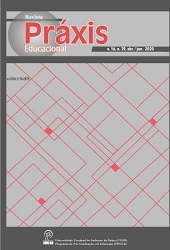THE DEVELOPMENT OF LOGICAL THINKING IN JUNIOR STUDENTS THROUGH PROJECT-BASED LEARNING
DOI:
https://doi.org/10.22481/praxisedu.v16i39.6377Palavras-chave:
pensamento lógico, desenvolvimento, correlação entre o original e o modelo, aluno júnior, tecnologia, critérios e níveisResumo
O artigo analisa o método de desenvolver o raciocínio lógico em alunos juniores com base na correlação entre o original e o modelo e possibilita, diferentemente dos métodos tradicionais, desenvolver o raciocínio, estruturas intelectuais e operações lógicas dos alunos de maneira mais eficaz. Com o auxílio das abordagens epistemológicas, de atividade sistêmica e do meio, é determinada uma estratégia para o desenvolvimento do pensamento lógico dos alunos por meio da aprendizagem baseada em projetos, baseada na correlação entre o original e o modelo. Garante o desenvolvimento efetivo de a) atividade intelectual das crianças em idade escolar b) pensamento c) memória lógica. O estudo comprova a eficácia da tecnologia apresentada, que implica 1) imersão no projeto, além de especificar suas metas e objetivos; 2) organização e planejamento das atividades dos alunos; 3) elaboração das principais etapas do projeto; 4) realização do projeto e sua apresentação; 5) avaliando os resultados. Com base nos dados da pesquisa, foram destacados os seguintes critérios: análise, síntese, comparação, classificação, generalização e outros critérios que permitiram determinar três níveis de desenvolvimento do fenômeno em questão. Nosso método fornece uma melhoria significativa dos resultados da pesquisa e garante a formação de atividades de aprendizagem universais (ULAs) informativas, regulatórias e analíticas. A avaliação da eficácia e validade do método proposto é corroborada por cálculos para o critério de Fisher (critério φ *). Os resultados comparativos da pesquisa antes e após o experimento em alto nível são 3.564. Os valores empíricos obtidos de φ * estão na área de significância. H0 é rejeitado (o eixo de significância = 1.64-2.31). Assim, o método em questão tem um sério impacto no desenvolvimento do pensamento lógico através da aprendizagem baseada em projetos de alunos juniores.
Downloads
Referências
Almazova, I.G.; Larskih, Z.P.; Chislova, S.N. (2018). “Educational process organization in primary school based on technological approach”, Astra Salvensis, 6, 95–105.
Altshuller, G. (1999). The Innovation Algorithm: TRIZ, systematic innovation, and technical creativity. Worcester, MA: Technical Innovation Center.
Asmolov, A.G.; Burmenskaya, G.V.; Volodarskaya, I.A. (2011). Formation of universal learning activities in the secondary school: from action to thought. Moscow: Prosveshchenie.
Baranov, S.P. (2012). The epistemological approach to primary education: a monograph. Sophia: Prepress.
Baranov, S.P.; Burova, L.I.; Ovchinnikova, A.Zh. (2015). Teaching and bringing up junior schoolchildren. Moscow: Akademia.
Barashkina, S.B. (2018). Scientific education of junior students through solving research problems using S.P. Baranov’s system “original–model–original”. Gnoseological aspects of education: International collected papers dedicated to Prof. S. P. Baranov. Lipetsk: LSPU.
Beloshistaya, A.V.; Levitas, V.V. (2019). The development of logical thinking in junior schoolchildren. Moscow: Yurait.
Bruner, J. (1973). Beyond the Information Given: Studies in the Psychology of Knowing. New York: W. W. Norton & Company.
Bullot, N.J.; Seeley, W.P.; Davies, S. (2017). “Art and Science: A Philosophical Sketch of Their Historical Complexity and Codependence”, Journal of Aesthetics and Art Criticism, 75(4), 453–463.
Carvalho de, E.; Skipper, Y. (2019). “We’re not just sat at home in our pyjamas!”: a thematic analysis of the social lives of home educated adolescents in the UK”, European Journal of Psychology of Education, 34(3), 501–516.
Coppola, C.; Mollo, M.; Pacelli, T. (2019). “The worlds’ game: collective language manipulation as a space to develop logical abilities in a primary school classroom”, European Journal of Psychology of Education, 34, 783–799.
Davydov, V.V. (2005). The activity theory of thinking. Moscow: Nauchny Mir.
Feldon, D.F.; Callan, G.; Juth, S.; Soojeong, J. (2019). “Cognitive Load as Motivational Cost”, Educational Psychology Review, 31(2), 319–337.
Freigang, S.; Schlenker, L.; Köhler, Th. (2018). “A conceptual framework for designing smart learning environments”, Foundations and Trends in Smart Learning, 5(27), 177–180. DOI: https://doi.org/10.1186/s40561-018-0076-8.
Gorev, P.M.; Utemov, V.V. (2014). A practical guide to developing creative thinking. TRIZ Methods and Techniques. Мoscow: URSS (Lenand).
Guilford, J.P. (1959). “Three Faces of Intellect”, American Psychologist, 14(8), 469–479. http://dx.doi.org/10.1037/h0046827.
Hanin, V.; Njuvenhoven van, C. (2019). “Emotional and motivational relationship of elementary students to mathematical problem-solving: a person-centered approach”, European Journal of Psychology of Education, 34(4), 705–730.
Kalahasthi, R.; Bhuptani, P.H.; Kapoor, H. (2017). “An Analysis of Thoughts, Behaviours, and Emotions in Daily Decision-Making”, Psychological Studies, 62(4), 409–420.
Klein, S.R. (2018). “Coming to Our Senses: Everyday Landscapes, Aesthetics, and Transformative Learning”, Journal of Transformative Education, 16(1), 3–16.
Lazareva, M.V. (2018). The epistemological substantiation of the cognitive development of preschool children from in light of S.P. Baranov’s ideas. Gnoseological aspects of education: International collected papers dedicated to Prof. S.P. Baranov. Lipetsk: LSPU.
Leontiev, A.N. (2005). Activity. Conscience. Personality. Moscow: Smysl.
Lewis, D.G.R.; Gerber, E.M.; Carlson, S.E.; Matthew, W.E. (2019). “Opportunities for educational innovations in authentic project-based learning: understanding instructor perceived challenges to design for adoption”, Educational Technology Research and Development, 67(4), 953-982.
Morozova, E.E. (2017). A technology for solving design problems in the practice of primary and preschool education. Saratov: Amirit.
Morozova, E.E.; Makarova, L.N. (2018). The formation of a research-oriented attitude to the world in junior students by means of the system of S. P. Baranov “original – model – original”. Gnoseological aspects of education: International collected papers dedicated to Prof. S. P. Baranov. Lipetsk: LSPU.
Overgaard, M.; Mogensen, J. (2017). “An integrative view on consciousness and introspection”, Review of Philosophy and Psychology, 8(1), 129–141.
Popova, A.A. (2012). L.V. Zankov’s system of developmental education: Mathematics (elementary level). Moscow: Dom Fyodorova.
Savenkov, A.I. (2016). The development of logical thinking. 7-8 years old. Moscow: Dom Fyodorova.
Sepp, S.; Howard, S.J.; Tindall-Ford, Sh.; Agostinho, Sh.; Paas, F. (2019). “Cognitive Load Theory and Human Movement: Towards an Integrated Model of Working Memory”, Educational Psychology Review, 31(2), 293–317.
Shigapova, N.V. (2015). Project-based technology for the formation of cognitive universal learning actions of junior schoolchildren in the process of teaching the course “The outside World”. Author’s abstract. Ekaterinburg: USPU Press.
Shopina, L.P. (2012). Lipetsk Pedagogical School: names, ideas, fates: axiological component in the works of K.A. Moskalenko, S.A. Shmakov, N.N. Kuzmin, O.A. Kazansky. Lipetsk: LSPU.
Simanovsky, A.E. (2018). On developing the aptitude for intellectual creative work in junior students: a monograph. Moscow: Yurait.
Soemer, A. (2016). “The Multicomponent Working Memory Model, Attention, and Long-term Memory in Multimedia Learning: A Comment on Schweppe and Rummer”, Educational Psychology Review, 28(1), 197–200.
Solovyeva, T.A. (2015). Fundamentals of technology of the intellectual-developmental educational process. Modern technologies in the Russian and foreign education systems. Proceedings of the IV International scientific-practical conference. Penza: RIO PGSKHA.
Svenitsky, A.L. (2018). A Brief Psychological Dictionary. Moscow: Prospekt.
Tigrova, I.V. (2018). Teaching junior students to solve non-standard problems in mathematics. Gnoseological aspects of education: International collected papers dedicated to Prof. S.P. Baranov. Lipetsk: LSPU.
Tsvetanova-Churukova, L.Z. (2012). Systematizing the learning material in teaching junior students. Doctoral thesis. Yelets: EGU Press.
Vi, C.T.; Ablart, D.; Gatti, E.; Velasco, C.; Obrist, M. (2017). “Not just seeing, but also feeling art: Mid-air haptic experiences integrated in a multisensory art exhibition”, International Journal of Human Computer Studies, 108, 1–14.
Vygotsky, L.S. (2016). The development of the higher psychological functions. Moscow: Yurait.
Wechsler, D. (1974). Manual for the Wechsler Intelligence Scale for Children-Revised (WISC-R). San Antonio: The Psychological Corporation.
Zak, A.Z. (2003). How to develop logical thinking. 800 funny problems for children aged 6–15. Moscow: Arkti.
Zankov, L.V. (1990). Selected pedagogical works. Moscow: Pedagogika.
Zinchenko, V.P. (2014). The psychological foundations of pedagogy: (The psychological and pedagogical foundations for building a system of developmental education by D.B. Elkonin–V.V. Davydov. Moscow: Direkt-Media.
Downloads
Publicado
Como Citar
Edição
Seção
Licença
Você é livre para:
Compartilhar - copia e redistribui o material em qualquer meio ou formato; Adapte - remixe, transforme e construa a partir do material para qualquer propósito, mesmo comercialmente. Esta licença é aceitável para Obras Culturais Livres. O licenciante não pode revogar essas liberdades, desde que você siga os termos da licença.
Sob os seguintes termos:
Atribuição - você deve dar o crédito apropriado, fornecer um link para a licença e indicar se alguma alteração foi feita. Você pode fazer isso de qualquer maneira razoável, mas não de uma forma que sugira que você ou seu uso seja aprovado pelo licenciante.
Não há restrições adicionais - Você não pode aplicar termos legais ou medidas tecnológicas que restrinjam legalmente outros para fazer qualquer uso permitido pela licença.












